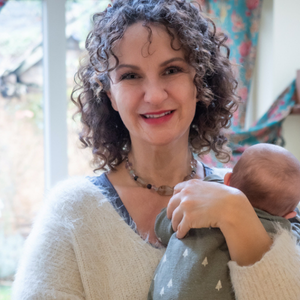Julianna & Luca's Slow Postpartum Story

On this week’s episode of the Slow Postpartum Podcast, I’m joined by Julianna Werner from postpartum.se in Stockholm, Sweden. Julianna honestly shares the story of her two very different postpartum experiences—one unplanned and unstable, the other carefully prepared and deeply nourishing.
Her story is a beautiful reminder that while we can’t avoid every challenge, we can choose to create a more supportive environment for ourselves in those tender weeks after birth.
Postpartum the first time
With her first baby, Julianna had planned a beautiful home birth. But what followed was a period of instability: a major home renovation, moving between relatives’ houses, and eventually a UTI that left her feeling vulnerable and depleted. Like so many mothers, she realised too late how much support she really needed.
She remembers isolating herself, unsure of her boundaries, and craving a safe sanctuary to heal in. Though she journaled and found small moments of rest, she also felt homesick, anxious, and unsupported.
Doing it differently the second time
By the time her second baby arrived, Julianna knew she wanted things to be different. She planned for rest, hired midwives to be on call, and worked with a traditional medicine mentor to create a custom postpartum meal plan: bone broths, porridges, congee, teas, and warming soups to truly nourish her body.
Her second birth—an unassisted home birth with midwives available just in case—was followed by a postpartum where food, rest, and celebration became the foundation. Family members brought venison stews and flowers, her parents reflected her joy back to her, and she felt seen and honoured in a way she hadn’t before.
Lessons from Julianna’s story
Julianna’s reflections offer so much wisdom for both parents and birth workers:
-
Food is medicine. Nourishing meals (especially broths, porridges, and soft, easy-to-digest foods) are essential for healing, digestion, and emotional safety.
-
Practical support matters. Emotional care is important, but nothing regulates the nervous system like a tidy home, food in the freezer, and a supported partner.
-
Celebrate the mother. Visitors can help with chores—but they should also celebrate the woman who has just given birth, and admire her beautiful new baby.
-
Plan for the whole year. Nutritional testing in pregnancy, six weeks postpartum, and at one year can guide true recovery.
“Food should be everyone’s focus during postpartum—having nourishing meals ready makes you feel safe, regulates your nervous system, and supports true recovery.” — Julianna Werner
Listen to the full episode
You can listen to Episode 12: Julianna’s Slow Postpartum Story here or by searching for Slow Postpartum wherever you get your podcasts.
For expectant parents: Download my free guide, Six Secrets to a Slow Postpartum, to help you plan for a calmer, more supported fourth trimester.
For doulas and birth professionals: Explore my free guide - Five Ways to Holistically Support Postpartum Families' with practical tools you can begin using right away.
You can find out more about Julianna and her work supporting new parents here at https://www.postpartum.se/

About Jojo & The Slow Postpartum Movement™
Jojo Hogan is a postpartum doula, massage therapist, yoga teacher, and founder of the international Slow Postpartum Movement™. With over 20 years of experience caring for mothers, babies, and families, Jojo helps parents plan and enjoy a peaceful, supported, and deeply nourishing postpartum. Through her podcast, trainings, and one-to-one support, she is on a mission to change the way society views the weeks after birth — from a time of struggle and isolation to one of rest, love, and transformation. Find out more here.
Categories: : motherhood, Postpartum, Postpartum Care, Postpartum Healing, Postpartum Nutrition
 Jojo Hogan
Jojo Hogan 